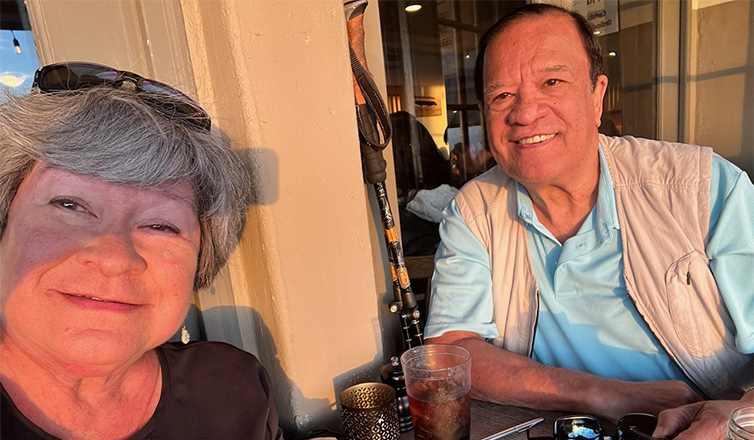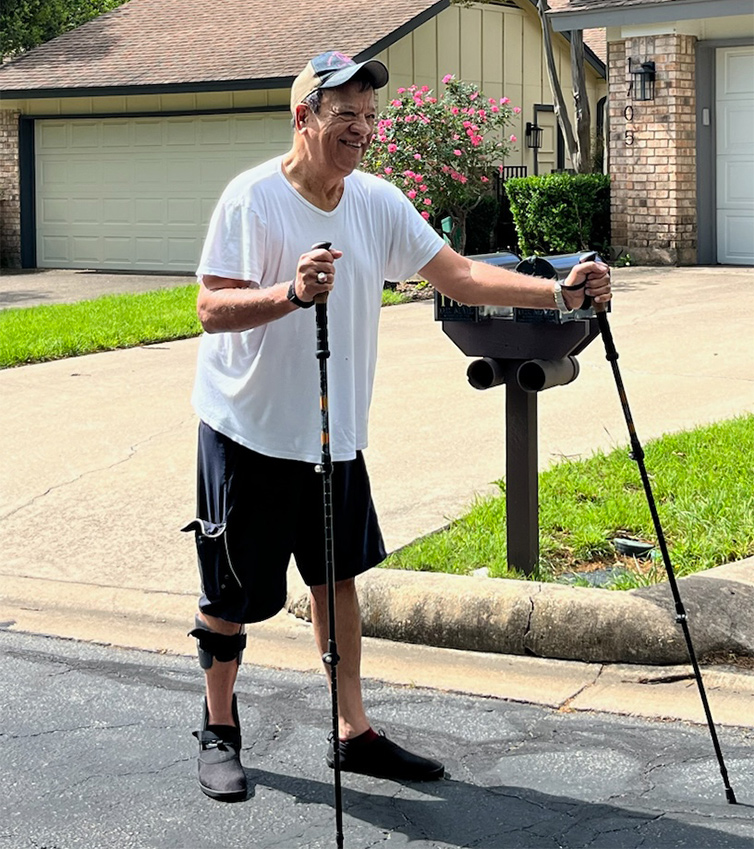Jim Burgess has always enjoyed being active, taking long walks, dancing with his wife, and traveling. That all changed about five years ago when the now 75-year-old Vietnam veteran and United States Air Force Academy graduate noticed his right leg getting weaker, his right foot was dragging, and he fell for the first time he could remember. He began to feel tingling in his right foot and leg, and he knew something was wrong. Jim started a multi-year medical journey that led him to Austin Neuromuscular Center and neuromuscular neurologist Dr. Yessar Hussain.
“The chronic pain was challenging, and I had to use walking sticks for balance,” explains Jim. “I’ve been a leader in the human resources industry for 47 years, and I currently teach classes at Austin Community College. I just love teaching, and I certainly didn’t want neuropathy to slow me down.”
“I saw Jim for a clinical evaluation and then performed Electromyography (EMG) and Nerve Conduction Studies,” says Dr. Hussain. “We diagnosed him with peripheral inflammatory neuropathy, a condition in which the communication network that transmits information from the brain and spinal cord to other parts of the body is damaged and doesn’t function properly.”
Neuropathy Causes and Symptoms
Peripheral neuropathy can have several different root causes. A chronic high blood sugar level associated with diabetes and prediabetes is the leading cause of neuropathy, particularly in the feet and legs. The nerve damage can also be caused by infections, toxins, or trauma. Autoimmune conditions may also cause neuropathy, and some forms of neuropathy are genetic.
More than 20 million people are estimated to have some form of peripheral neuropathy in the United States. It can manifest in various ways, depending on the affected nerves and the underlying cause. Here are some common neuropathy symptoms:
- Numbness and tingling typically start in the hands and feet
- Burning pain or a searing sensation happens in the affected areas
- Sharp pains or stabbing sensations can be sudden and unpredictable
- Muscle weakness in the hands and feet due to the damaged nerves makes it difficult to grip objects or maintain balance
- Increased sensitivity to touch or light that can be uncomfortable
- Autonomic nerve damage associated with small-fiber neuropathies may cause excess sweating, heat intolerance, inability to regulate blood pressure, and gastrointestinal issues
A Promising Treatment
Treatment for peripheral neuropathy varies greatly depending on the type of nerve damage, symptoms, and the areas affected. Doctors may suggest mechanical aids, medications, or behavioral strategies as part of a care plan.
Jim decided to try an intravenous immunoglobulin (IVIG) treatment at ANC approved by the Food and Drug Administration for his type of neuropathy. The IVIG is an immune-modulating blood-derived product that is used for treating inflammation of the nerves, and it is only FDA-approved for certain types of neuropathy. He began the treatment in May 2023 after discussing the diagnosis and treatment process with Dr. Hussain and receives it intravenously every three weeks.
“I feel like the infusion is working well,” says Jim. “The entire treatment process takes about 4 hours. So after the treatment, I usually go home and take a nap. Then I immediately begin to feel better. Since I started the IVIG, my foot drop seems to have lessened and the tingling and pain in my right foot and leg has reduced.”
Jim says the IVIG treatment has given him the strength to walk longer distances with less reliance on his walking sticks for balance. He has continued his physical therapy treatment as well, designed to help with balance training.
Jim joins his wife on walks for the first time in a few years. They’ve started traveling again and recently enjoyed a Danube River cruise and a trip to a California beach. The innovative IVIG treatment has gotten him back to more of the active lifestyle he craves, and he’s incredibly grateful to Dr. Hussain and ANC for making that possible.
To learn more about Austin Neuromuscular Center, the conditions we treat, and our clinical research, click here or call (512) 920-0140. Follow us on Facebook, LinkedIn, Twitter, and Instagram for important updates.

